|
| Home
| Biography
Index | Walter | Marie | Earl |
Neal | Ruth L. | Betty M. |
Howard |
Howard & Marilee Williams
An Autobiography:
April 2001
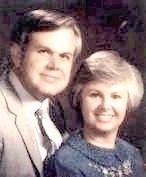 Overview Overview
Howard and Marilee Williams were married
October 31, 1970 after a summer courtship and their six
collective kids having summer picnics, swim parties and trips
together. This is the story of their lives before meeting and
their lives together since.
Howardís early years in Indiana
I was born Howard Walter Williams in
Evansville, Indiana on October 18, 1937. I was the eldest child
of Walter and Marie Williams. The Great World Depression had
pressed down on the world like a lead weight for five years
previously and there was no relief in sight. Had we known the
relief would come in the form of a world war we would have opted
for the depression to continue. There was war ongoing in Europe
and in the far East.
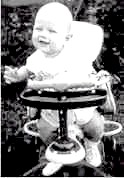 No one could have predicted that I would
see a world war as a boy just as my father did. His war started
when he was 3 in 1911. "My" war spread across Europe
and into Russia on the one axis and from Japan to China and the
South Pacific at the opposite world axis. Gradually by December
7, 1941, when I was 4 and my father was 33, it became a world
wide war. Two generations Ėtwo world wars. And a world
depression in between. Not the best of times. Yet in my little
world, in southern Indiana on the Ohio River, life was good and
those factors didnít cause me a lot of grief. No one could have predicted that I would
see a world war as a boy just as my father did. His war started
when he was 3 in 1911. "My" war spread across Europe
and into Russia on the one axis and from Japan to China and the
South Pacific at the opposite world axis. Gradually by December
7, 1941, when I was 4 and my father was 33, it became a world
wide war. Two generations Ėtwo world wars. And a world
depression in between. Not the best of times. Yet in my little
world, in southern Indiana on the Ohio River, life was good and
those factors didnít cause me a lot of grief.
My parents had worked hard all their
lives, were able to get and keep jobs and they saved every cent
they could. My parents saved enough to buy a home before having
me. Something very rare in any timeframe, especially in the
depression years. I lived in a nice home on Lafayette Street in
the north end of Evansville and didnít feel deprived of
anything. I didnít know what a depression was. Because of
their industriousness and their frugality which made sure the
necessities were available. Looking back, I can see the reasons
ice cream wasnít bought every time it was asked for. And why
that teddy bear in the window cost too much.
I did know what World War II was by the
time I was 5 or 6. My friends and I played with small model war
airplanes and wooden guns. My dad made me a wooden machine gun
that would make a rat a tat tat sound of a small stick clacking
over a cogged wheel when I turned the crank. My friends would
dig trenches and fox holes. An abandoned car in the backyard of
one friend was a "tank" and we could throw dirt clods
at it. When I was 7 the war took a turn for the good when the
Allies landed at Normandy on D-Day June 1941. The LST ships dad
helped build were vital to that and other campaigns.
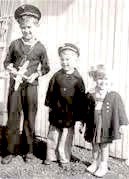 I started Henry Reis School in
kindergarden in September 1942 and remember the first day
vaguely. Finger painting is the most memorable to me. In later
grades we played marbles on the bare dirt ground by drawing a
circle and shooting marbles out of the center. On frozen winter
days we would slide on ice and see who could slide the farthest.
Cousin Bob Bollinger was two grades ahead of me. Twice a day a
bugler would play taps and everyone would salute the raising and
lowering of the national flag. I attended that school until
early 1946 and completed the third grade before moving to
California. I started Henry Reis School in
kindergarden in September 1942 and remember the first day
vaguely. Finger painting is the most memorable to me. In later
grades we played marbles on the bare dirt ground by drawing a
circle and shooting marbles out of the center. On frozen winter
days we would slide on ice and see who could slide the farthest.
Cousin Bob Bollinger was two grades ahead of me. Twice a day a
bugler would play taps and everyone would salute the raising and
lowering of the national flag. I attended that school until
early 1946 and completed the third grade before moving to
California.
Relative to the War, I started school just
10 months after Pearl Harbor and left Henry Reis less than a
year after VJ day. No wonder everyone was so patriotic with the
flag. We didnít talk of the war at school. But in those early
school years there were tens of millions of people killed by war
and the diseases that go with it. I remember celebrations
vaguely of VE day when Germany surrendered.
The school is still there as of 1984 and
is very much the same as in the 40s. We had one car that Dad
generally drove to International Steel to work so I walked to
school. This included days with snow which was always a treat.
We loved to pick cockle-burrs about the size of a small pea and
throw them at each other because they would stick on our
clothing. We carried a lunch pail. I remember traumatic
incidents best. Seeing a dead dog by the side of Heidlebach
Avenue. Seeing a kid throw his lunch pail in the air and hitting
another on the head causing blood to gush. Having an older kid
tell me that he knew a guy who had a deep hole punched in his
heel when he was crossing the street and that it could happen to
me.
There is a vivid recollection of Mom and
Aunt Ruth talking seriously in the living room when Mom knew
that brother Harold was coming. They knew that but Iím sure I
didnít. I heard "blah blah ..take Howard to my houseÖblah
blah, did you call the doctor. Is he coming soon?" I
would have been 3 or 4 so I was very concerned for that to be
burned in my memory. Also the terrible crying when he was
circumcised. Again, I didnít know what was going on and
neither did Harold. Sister Janet was born in 1943 when I was in
the first grade.
Mom had two identical twin brothers, Earl
and Neal who lived several blocks away. Bob Bollinger was Neal's
son and only child. Mom also had a younger sister Ruth and their
mother, my grandmother, Lula Barth-Bollinger, who also lived
close by. My grandfather on Momís side died before I can
remember. All lived within two blocks of each other.
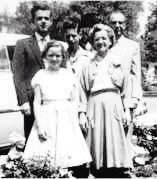 Dad had a very large family. His mother
died when he lived on the farm in Posey County, Indiana near the
town of Mount Vernon. His father couldnít keep the farm going
and moved them to town. But shortly he died of spinal meningitis
and his older sisters raised them. Stella was the oldest and
became his new mom. Dad had seven sisters and two brothers. The
boys were all the youngest. If they were the oldest, chances are
his dad could have made a go of the farm. The farmhouse he was
born in is still in very good shape and Harold and I have
separately visited it. Uncle Bob was dadís non-identical twin.
They really looked identical in many ways. I remember visiting
Bob in mid 80s when he was in his 70s and seeing such a strong
resemblance. Dadís other brother was Bill and was nicknamed
Stocky from the time he used to like to hang around the
stockyards and see the cattle and the operations there. He was 6
ft 5 inches tall and stood out in a crowd in that generation. Dad had a very large family. His mother
died when he lived on the farm in Posey County, Indiana near the
town of Mount Vernon. His father couldnít keep the farm going
and moved them to town. But shortly he died of spinal meningitis
and his older sisters raised them. Stella was the oldest and
became his new mom. Dad had seven sisters and two brothers. The
boys were all the youngest. If they were the oldest, chances are
his dad could have made a go of the farm. The farmhouse he was
born in is still in very good shape and Harold and I have
separately visited it. Uncle Bob was dadís non-identical twin.
They really looked identical in many ways. I remember visiting
Bob in mid 80s when he was in his 70s and seeing such a strong
resemblance. Dadís other brother was Bill and was nicknamed
Stocky from the time he used to like to hang around the
stockyards and see the cattle and the operations there. He was 6
ft 5 inches tall and stood out in a crowd in that generation.
I remember we would visit Aunt Lula and
Aunt Eva in their homes closer to downtown Both their husbands
worked for the railroad. Many did in those days. They had no
children at home at that time so how to keep little Howard quiet
while they talked was a problem. I would get stern lectures on
the way home about being too rambunctious. Going to Aunt Graceís
large two story house was a different story. She had kids of
every age and type. We would have fun with the piano and just
playing kids play. Marlene was the closest to my age. Marlene
later spent years taking care of Stocky and his wife in their
last years and was very selfless in that. Going to visit Aunt
Lillian gave me a curiosity about their pot bellied stove.
Shirley was about my age also and I remember our playing there.
There were some traditions that were
special. Christmas Eve was often at Aunt Ruth and Uncle Franks.
There would be presents for all the kids. Aunt Ruth really loved
to decorate for Christmas and it was special to her. Momís
uncle Benjamin Barth "Ben" would have family picnics
that I believe were annual. Probably on his birthday. They were
in a park. Maybe Garvins or Mesker. He would make a delicious
beef vegetable soup that was special in that the ingredients
were ground up before cooking. The texture and taste was fairly
homogeneous that way and it was easy to eat. Several generations
of our family ate momís version of Uncle Benís "Burgo"
soup as he called it. The name implies a German ancestry with a
meaning something like "town" in the manner of the
name berg. I seem to remember one very big pot it was made in.
It was in good weather and a lot of beer was consumed which
probably made the soup even better. These Burgo fests were done
even in wartime and were very much enjoyed.
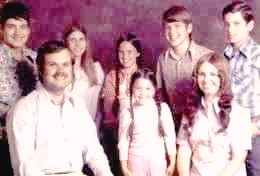 One other culinary delight that is popular
in the Evansville area is thin sliced pork in barbecue sauce. It
is a specialty of restaurants in town and of many townsfolk
probably. The barbecue sauce is not especially sweet or thick
like those currently popular. It is soupy and soaks into the
thin sliced and well done lean meat. All my life I have been
able to recall and crave its taste. Same with all the uncles and
aunts that came west. There are probably several herbs and
spices that are used in a secret formula to give that taste.
Also, compared to the other meats we ate that were a little
"lower on the hog" prime cuts of pork would be
delicious no matter how cooked. Compared to ground beef heart
and brain made into fried patties, it was especially good. One other culinary delight that is popular
in the Evansville area is thin sliced pork in barbecue sauce. It
is a specialty of restaurants in town and of many townsfolk
probably. The barbecue sauce is not especially sweet or thick
like those currently popular. It is soupy and soaks into the
thin sliced and well done lean meat. All my life I have been
able to recall and crave its taste. Same with all the uncles and
aunts that came west. There are probably several herbs and
spices that are used in a secret formula to give that taste.
Also, compared to the other meats we ate that were a little
"lower on the hog" prime cuts of pork would be
delicious no matter how cooked. Compared to ground beef heart
and brain made into fried patties, it was especially good.
Once there was a family get-together at a
farm north of the airport and I remember the chicken and
dumplings. Also the tour of the root cellar where there were
lots of canned pickles. Donít know who lived there but it was
a special time.
The Williams relatives lived closer to
downtown and the homes were on very narrow lots not much wider
than 30 feet or so. But they were very deep allowing for gardens
and grass and had alleys in the back and sidewalks I the front.
Aunts Eva and Lula lived in these small houses all their adult
lives. Modern women would look down on their small size but they
were very practical in many ways compared to new houses of today
in California. They were very affordable and could easily be
bought by young couples and paid off in more like 10 years than
30. Utilities would be one-tenth that of modern large homes.
They had an attic for storage. I would guess that they were less
than 500 square feet.
The cars were very practical also. We had
a 1935 4 door black Chevy which was reliable and very capable to
meet our needs. It was much like a Model A Ford but advanced
more by a couple years. You sat up in it and could see well out
of itís square windows. The four cylinder engine was low
pressure and very very simple. Many repairs could be done
without special tools or knowledge. Nothing was hydraulic so
there were no pumps or filters or lines to leak. Even brakes
were mechanical. When you pushed on the brake there were
mechanical levers that went to the brake pads on the wheels. If
you dinged a fender you didnít have to get a special paint
touchup. All cars were black.
Telephones didnít have dials or buttons.
You turned a crank which generated signal to the local operator.
She connected your line physically to the line of the party you
were calling.
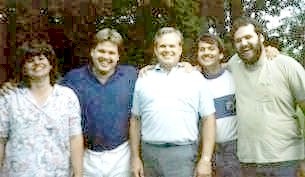 There were no televisions in home use.
People were working on their invention about then. Our radios
were in large and bulky wood cabinets. Partly to allow for a
reasonably large speaker made of paper that would serve well.
Some had 78 rpm phonograph record players. Ours didnít. The
large size helped make them sturdy. Us kids would lay down on
the floor to put our ears close to the radio speaker to hear
programs that appealed too us and not our parents. We liked
G-Men in Action about the FBI catching criminals. And Fibber
McGeeís comedy. His wife Molly and he would have funny
conversations about everyday life. He had a closet full of his
things and whenever he went to get something out of it there
would be a loud crash of his unorganized things onto the floor.
Also Amos and Andy. The special programs were the scary ones
like the Shadow and the Whistler. "The Shadow knows many
things for he walks by night". A little organ music and we
were riveted. Jack Benny also was funny with his dry sarcasm
that fit well into any mid-west home. There were no televisions in home use.
People were working on their invention about then. Our radios
were in large and bulky wood cabinets. Partly to allow for a
reasonably large speaker made of paper that would serve well.
Some had 78 rpm phonograph record players. Ours didnít. The
large size helped make them sturdy. Us kids would lay down on
the floor to put our ears close to the radio speaker to hear
programs that appealed too us and not our parents. We liked
G-Men in Action about the FBI catching criminals. And Fibber
McGeeís comedy. His wife Molly and he would have funny
conversations about everyday life. He had a closet full of his
things and whenever he went to get something out of it there
would be a loud crash of his unorganized things onto the floor.
Also Amos and Andy. The special programs were the scary ones
like the Shadow and the Whistler. "The Shadow knows many
things for he walks by night". A little organ music and we
were riveted. Jack Benny also was funny with his dry sarcasm
that fit well into any mid-west home.
Todayís kids would feel those programs
were laughably simple. But we enjoyed them as much as those of
the 21st century. They really used our imagination.
We would stare into the speaker and "see" the faces of
each person talking. They would look the same each week. And
everyone had a face. No one was faceless just because it was
radio..
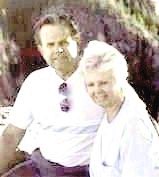 Of course the special treat was to see the
movies at the theatre. I only remember one in the early 40s. It
was "The Wolfman" with Lon Cheney. Scared the pee out
of me almost literally. I believe all were black and white. The
newsreels from the war were the only way we could get a glimpse
of what the war was like and they were well sanitized. Of course the special treat was to see the
movies at the theatre. I only remember one in the early 40s. It
was "The Wolfman" with Lon Cheney. Scared the pee out
of me almost literally. I believe all were black and white. The
newsreels from the war were the only way we could get a glimpse
of what the war was like and they were well sanitized.
A favorite pastime for young boys during
the war was to hold small warplane models and make them swoop
and dive shooting at make believe Germans and Japanese.
Soon to come:
H family Going to California
H Pre High School
H High School
H College
Aerojet Azusa
Divorce and Meeting M
M Early years
M moves to SB
M High School
Betty and the Girls
Norton AFB
Childcare
Divorce and meets H
Brady Bunch Years
The late 70s
The 80s
The 90s
Looking to Retirement
Copyright © 2001
Williams Family from Evansville, Indiana |